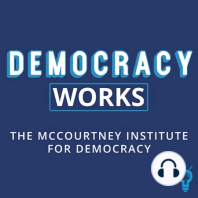5 min listen
Middle America, Part 2: Grassroots organizing and rebooting democracy
FromDemocracy Works
ratings:
Length:
35 minutes
Released:
Aug 27, 2018
Format:
Podcast episode
Description
Last week, we heard from Salena Zito about the segments of middle America who supported Donald Trump after voting for Barack Obama. This week, we talk with another Pittsburgh resident, Lara Putnam, about a different version of Middle America — the college-educated, middle-aged suburban women who have dusted off the organizing skills honed through decades of volunteering to affect change in their communities.
Lara is a Professor and Chair of the History Department at the University of Pittsburgh and co-author with Theda Skockpol of the article “Middle America Reboots Democracy.” in the journal Democracy. She argues that grassroots work is happening behind the scenes in “purple” suburbs, areas that are ignored in the red state/blue state and urban/rural media narratives.
Grassroots groups like those Lara observed in western Pennsylvania are mixing traditional organizing tactics with social media to raise awareness and push for change at the local and state levels, far away from the divisions that bog down national politics. To borrow a line from the article, “If your question is how the panorama of political possibility has shifted since November 2016, your story needs to begin here.”
Thank you to WESA and WYEP in Pittsburgh for allowing us to use their community studio to record this interview with Lara.
Additional Information
Middle America Reboots Democracy in Democracy: A Journal of Ideas
Discussion/Reflection Questions
What is the relationship between social engagement and political engagement?
How does the populism Salena Zito described differ from the populism behind the groups Lara observed?
Lara argues that local grassroots groups have been overlooked by the media and national political parties. Do you agree? If so, why do you think it’s happening?
Both Republican and Democratic grassroots appear to want to make America great again. Can both visions of America coexist? Is there a possibility that these two less ideological groups merge into a new political coalition?
Lara said that many of the grassroots groups she observed are lead by middle class women. Do you think the tone or activities of these groups would be different if they were run by younger women? Or by men?
Interview Highlights
[3:28] As a history professor, how did you come to write about a political movement?
Lara: After the 2016 election, I looked around at local politics to see where I could make a change. Based on the national political coverage, I expected to see high levels of energy and organization for progressive politics in the city and little in the suburbs. However, what I found was actually that I was missing the real story. What I saw in these smaller towns was people engaging again in the political process through organization. This wasn’t getting covered nationally. This is where I kicked into historical gear. We know that large scale changes nationally have their roots in local developments. Therefore, it leads us to believe that these changes at the local level should be looked at as the possible motivation behind future national changes. So face to face groups which appear insignificant, can actually lead to large political changes.
[6:35] What does middle America mean to you after your research?
Lara: These movements are being started by women. Particularly, women who had already been involved in the political movement prior to the 2016 election. What we mean by “middle America” here is that these democrat movements are taking place not in the stereotypical coastal democrat strongholds, but rather in small rural towns in the middle of the country.
[9:30] Why do you think the national media is missing this trend?
Lara: The national media is really obsessed with candidates. While this does impact the spread of movements like the ones we’re seeing, it doesn’t completely stop them. Remember that politics is local. Most political conversations and political knowledge is shared in local conversations such as when people are running errands
Released:
Aug 27, 2018
Format:
Podcast episode
Titles in the series (100)
What is Democracy Works?: From the McCourtney Institute for Democracy at Penn State, this is Democracy Works. In this episode, hosts Michael Berkman and Chris Beem take a few minutes to explain why we wanted to start this podcast and what we hope to achieve through our interviews and conversations. by Democracy Works
